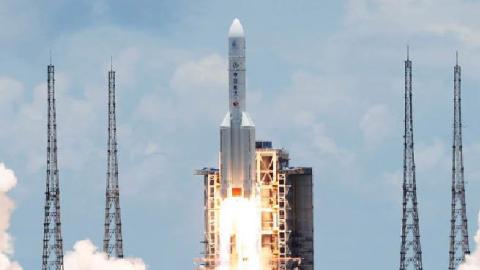With the China Aerospace Science and Technology Corporation (CASC) announcing plans to conduct over 40 orbital launches in 2021 with “the [Communist] Party Central Committee with Comrade Xi Jinping at the core,” will the U.S. finally take the growing space threat from China as seriously as it should?
China aims to land on the moon and build a base there by the decade’s end. If its recent success at landing a rover on the moon’s far side is any indication, it’s advancing at a much quicker pace than we are. In fact, at the end of last year, the country planted the People’s Republic flag on the lunar surface and became the first country to execute robotic docking in lunar orbit.
These developments are troubling. The Pentagon has warned that China is building up an arsenal of space weaponry, and it is doing it quickly, putting American space infrastructure at a great disadvantage. The People’s Republic of China is explicitly looking to supersede America, and it seems willing to do anything it can to make that happen.
Past congressional bodies have recognized the unique danger that China poses to our space program. It thus passed restrictions disallowing cooperation between the two nations’ space programs without special congressional approval. Now the threat from the communist regime has grown stronger than ever before, and Congress needs to do more to protect the nation from its abuses.
In his September Senate testimony, the NASA administrator, Jim Bridenstine, made it clear that China is increasingly looking to undermine our space investments, including through conducting espionage that could aid the Chinese military. The growing sophistication of digital espionage and the burgeoning presence of nontraditional commercial partners lends new avenues for adversaries to breach the U.S.’s current security system.
The United Nations Committee on the Peaceful Uses of Outer Space has also expressed concern about the prospects of orbital confrontation with China. Its members believe that the 1967 Outer Space Treaty is under threat and that an arms race between the United States and China can only lead to disaster. With both nations clearly escalating their space investments, 2021 may be the last year to right the ship before it runs ashore.
That’s why outgoing senator Cory Gardner (R., Colo.) proposed amendments in line with steps other agencies have taken to prevent China from running roughshod over NASA. His amendments will have NASA and the Government Accountability Office review NASA contractors for any links to China that could harm national security.
Ensuring the passage of similar amendments in the next Congress will be critical for the health of key U.S. space projects, many of which are entering their crucial development phases. It will also be essential for evaluating the threats China poses to U.S. space partners.
It’s also essential that Congress protects the International Space Station (ISS) — yet another Chinese-government target.
The ISS is the most ambitious global project in human history. Nations that had until very recently been bitter rivals, such as the U.S. and Russia, have peacefully come together to conduct work on it for the benefit of all humanity. But China is now developing a rival station. Bridenstine made clear that the country is pitching it to our current ISS partners in hopes of stealing them away. It’s just China’s latest attempt to degrade America’s standing as a global leader in the international exchange of ideas and scientific progress.
That’s why the ISS needs the full funding and support of Congress.
Make no mistake about it: These threats from China are just the beginning. The country is expected to provide further plans for its 2021–2025 space policy this month and release a comprehensive white paper on the topic by the end of the year.
Congress must make sure that it allocates enough funds to protect against China and other adversarial nations that would like nothing better than to weaponize space against the U.S. Doing so will protect American security and ensure that NASA retains its position as the modern world’s preeminent space program.
Read in National Review

















